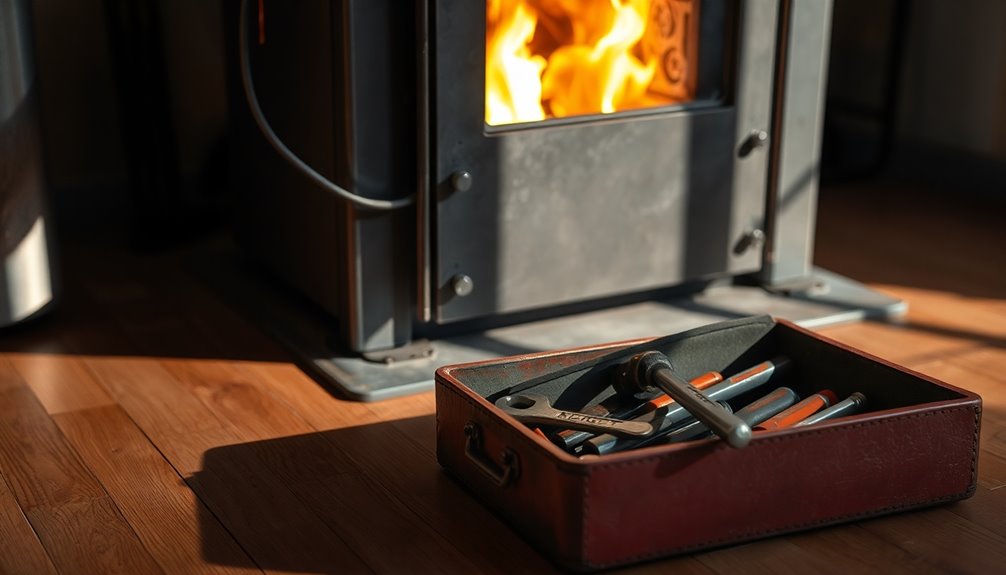A clicking furnace can indeed be dangerous. It often indicates issues with the ignition system or ductwork that need immediate attention. For instance, a dirty flame sensor or a faulty igniter may repeatedly try to ignite gas, which can lead to dangerous situations. Regular maintenance is key to preventing these problems. You can clean the flame sensor, check electrical connections, and secure loose ducts yourself, saving you money. Don't ignore persistent clicking sounds; they can signify deeper issues. Keep your furnace safe and efficient by addressing concerns promptly—there's more to learn about maintaining your furnace effectively.
Understanding Clicking Noises
When you hear clicking noises coming from your furnace, it can often point to specific issues that need attention. One common culprit is a malfunctioning ignition system. If the flame sensor or electric igniter isn't working correctly, you may hear repeated clicking sounds as the system struggles to ignite. This can compromise your furnace's safe operation, so it's essential to address these issues promptly. Additionally, expense tracking tools can provide insights on budgeting for necessary repairs.
Excessive clicking may also indicate the expansion and contraction of metal components due to temperature changes. This can lead to loose or damaged parts, which require inspection and potentially tightening. Regular inspections are vital for maintaining financial health, ensuring that you can budget for any necessary repairs or replacements.
Additionally, ductwork problems like loose connections can amplify clicking sounds, making regular checks for gaps and damage important.
Debris accumulation within the furnace can also produce clicking noises. Loose screws or foreign objects can hinder peak operation, so keeping your furnace clean is critical. Regular maintenance can help save time and effort, much like using expense management apps that streamline financial organization and enhance accuracy.
Common Causes of Clicking
When you hear clicking sounds from your furnace, it often points to ignition system problems, like a faulty flame sensor or electric igniter. Additionally, the expansion of ductwork can create similar noises as temperatures fluctuate. It's essential to conduct periodic audits of your furnace's components to guarantee your furnace operates safely and efficiently. Regular maintenance can help prevent these issues and ensure timely timely payments for service calls and repairs. Implementing a structured framework for saving and investing can also contribute to funding necessary maintenance and unexpected repairs.
Ignition System Problems
A clicking furnace often signals problems with the ignition system that shouldn't be ignored. When you hear that clicking sound, it's likely due to issues with the flame sensor or the electronic igniter. A dirty or faulty flame sensor may fail to detect the gas flame, leading to repeated clicking as the system tries to ignite without success.
Moreover, your electronic ignition system relies on generating a spark to ignite the gas. If the igniter is worn or damaged, it can create persistent clicking noises, which indicate that it's struggling to perform its job.
Additionally, interruptions in the gas supply—such as clogged lines or defective valves—can cause the igniter to click repeatedly, as it doesn't receive the necessary gas for ignition. This situation can be dangerous if left unaddressed.
To prevent these issues, regular maintenance is essential. Cleaning the flame sensor and inspecting the ignition system can help eliminate clicking sounds and guarantee safe operation.
Don't wait for the problem to escalate; take action to maintain your furnace and keep your home safe.
Ductwork Expansion Sounds
Ductwork expansion sounds can often produce clicking noises as the metal components expand and contract with temperature changes during furnace operation. As your furnace heats the air, the metal ducts may stretch and then shrink, leading to these sounds.
If you notice these clicking noises, it could be a normal byproduct of thermal expansion, but other issues may be at play.
Loose connections or improperly secured ducts can exacerbate the clicking sounds. When air flows through the ducts, it can amplify these noises, making them more noticeable in your living spaces.
If you hear persistent clicking, it's wise to inspect your ductwork for gaps or damage. Regular checks can help you identify potential issues before they escalate.
Securing and repairing duct connections is crucial to reduce excessive clicking noises and improve your system's efficiency.
By addressing these problems, you'll not only enjoy a quieter home but also guarantee your heating system operates smoothly.
Don't ignore those clicking noises; they could indicate underlying issues that need your attention.
Ignition System Issues
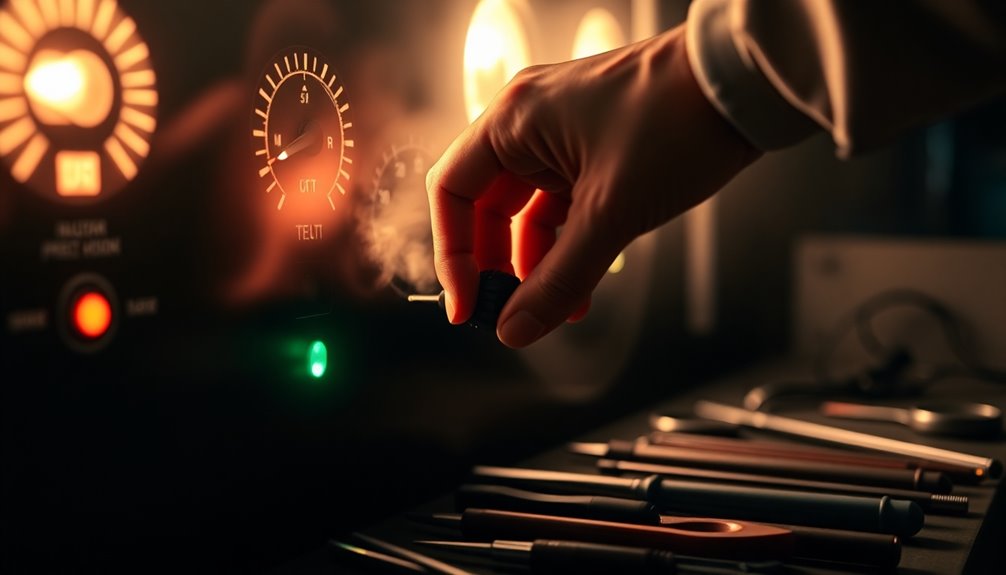
Clicking sounds from your furnace during ignition often signal underlying issues with the ignition system. If your gas furnace is making these noises, it's essential to investigate right away to avoid potential safety hazards.
Here are some common causes of ignition system issues:
- Faulty Electric Igniter: This may fail to ignite the gas properly, causing a dangerous buildup.
- Dirty Flame Sensor: A dirty sensor can block functionality, leading to repeated clicking and possible gas leaks.
- Failed Spark Creation: An electric ignition system that can't produce a spark will make similar clicking sounds.
- Wiring Issues: Loose or damaged connections can compromise the ignition system, resulting in unsafe conditions.
- Lack of Maintenance: Regularly cleaning the flame sensor and checking electrical connections can prevent problems. Effective management of these maintenance tasks is crucial to ensuring safety, as streamlined processes can significantly improve the longevity of your furnace.
Ignoring these issues can lead to more than just annoying sounds; it can create unsafe situations in your home. Additionally, timely maintenance notifications for your furnace can help ensure that any issues are addressed promptly.
For your safety, make sure to schedule regular maintenance for your gas furnace, focusing on the ignition system, to keep everything running smoothly and safely.
Ductwork Expansion and Contraction
When your furnace operates, temperature changes can cause the ductwork to expand and contract, leading to those annoying clicking noises you might hear. If the ducts aren't properly secured, these sounds can become even more pronounced, making it essential to check for loose connections. Addressing these issues not only reduces noise but also helps maintain your furnace's efficiency. Additionally, ensuring sustainable practices in home maintenance can contribute to a more eco-friendly living environment. Implementing sustainable delivery practices during any repairs or maintenance can further enhance your home's environmental impact. Regularly checking for loose connections can prevent further damage to your furnace and improve its overall performance.
Temperature-Related Duct Noise
In your home, the sounds of temperature-related duct noise can be unsettling, especially during the furnace's operation.
These noises often arise from metal ductwork expanding and contracting due to temperature fluctuations, creating audible clicking or popping sounds. When your furnace heats up or cools down quickly, the rapid changes can exacerbate these noises as the duct material adjusts.
To minimize temperature-related duct noise, consider these tips:
- Regularly inspect and tighten duct connections to prevent loose parts from amplifying sounds.
- Make sure ducts are properly insulated to reduce heat loss and curb expansion and contraction.
- Seal any gaps or leaks in ducts to keep air flowing efficiently.
- Maintain a consistent temperature in your home to lessen rapid heating and cooling cycles.
- Schedule annual HVAC maintenance to identify potential issues before they escalate.
Securing Loose Ducts
Addressing temperature-related duct noise often leads to the discovery of loose ducts. These loose ducts can exacerbate that annoying furnace clicking sound by allowing air to escape and causing pressure changes. This not only affects your comfort but also makes your heating system less efficient, which could hike up your energy costs.
To secure your duct connections, use metal screws or high-quality duct tape. This minimizes movement during temperature fluctuations, greatly reducing the likelihood of those clicking sounds.
Regularly inspect your ductwork for any loose or damaged sections—staying proactive helps maintain ideal airflow and prevents unnecessary noise.
Remember, expanding and contracting metal ductwork can create audible clicking if it's not properly secured. Consequently, routine maintenance is essential.
Additionally, consider using insulation around your ducts to help stabilize temperatures and reduce thermal expansion. This simple step can further decrease the chances of clicking sounds caused by loose connections and guarantee your blower motor operates smoothly.
Faulty Blower Motor
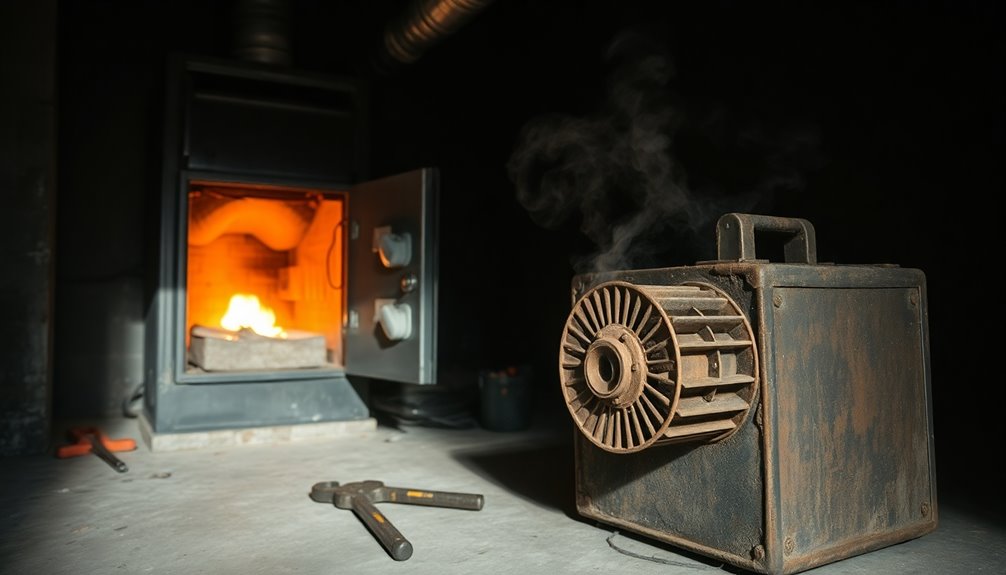
A clicking noise from your furnace often signals a faulty blower motor, which can stem from debris buildup or wear on the blower wheel. Misalignment of motor components can also contribute to these clicking sounds, affecting your furnace's efficiency and lifespan. Additionally, regular maintenance of your blower motor can lead to enhanced investment strategies that help you allocate funds more effectively. Regular maintenance can also promote financial literacy by encouraging you to understand the importance of keeping your appliances in good working order.
If you notice persistent clicking, it's vital to address the issue promptly.
Here are some tips to help you maintain your blower motor:
- Regularly clean the blower motor to remove debris.
- Lubricate the blower motor components as needed.
- Inspect for any misalignment issues with motor components.
- Monitor the blower wheel for wear and tear.
- Consult a professional if the clicking noise continues.
Ignoring the clicking noise can lead to further damage, increased energy costs, and potential safety hazards in your furnace system. Additionally, maintaining your blower motor can contribute to tracking your financial health since efficient appliances can reduce energy expenses.
By keeping your blower motor in good condition, you can prevent these problems and guarantee your furnace operates smoothly.
If necessary, don't hesitate to seek professional help to assess whether repairs or replacements are needed for your blower motor.
Taking these steps can save you time, money, and stress in the long run.
Debris in the Furnace
Debris in your furnace can lead to serious problems, including obstructed airflow and overheating. This can result in system failure or even safety hazards. Common culprits of debris in the furnace include dust, dirt, and foreign objects that accumulate around the blower fan or burners, often creating annoying clicking sounds during operation.
To keep your HVAC system running smoothly, regular inspection and cleaning of furnace components are vital. Loose screws or small items can find their way into the vents, adding to the noise and compromising proper furnace function. Routine checks for debris accumulation are important in preventing these issues.
You can also reduce the risk of debris entering your system by maintaining a clean area around your furnace. Regularly sweeping and vacuuming the surroundings not only promotes peak performance but also extends the longevity of your HVAC system.
Flame Sensor Maintenance
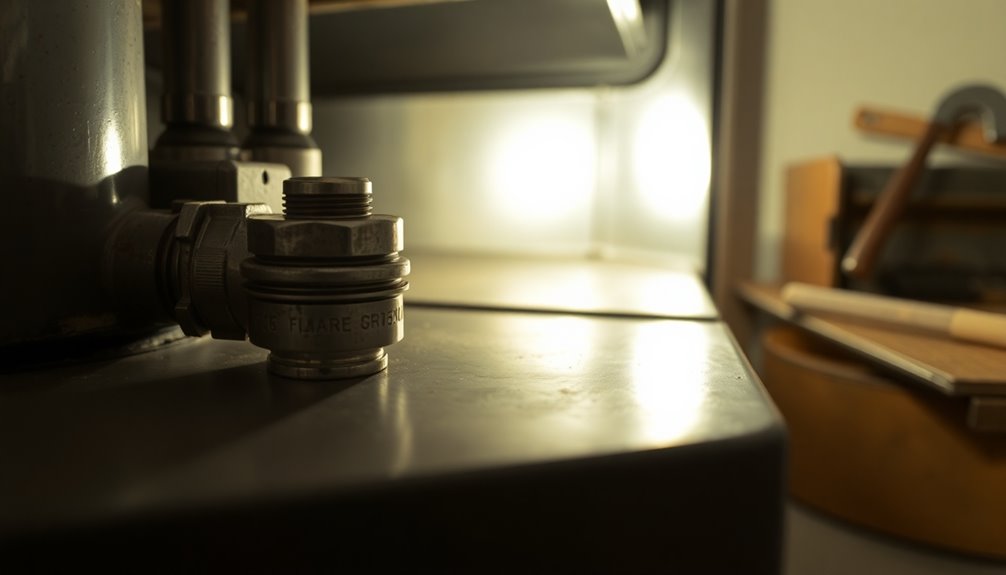
The flame sensor plays an important role in your furnace's safety and efficiency. It guarantees your furnace operates only when a flame is present, preventing unburned gas from leaking into your home.
To keep your furnace running smoothly, regular flame sensor maintenance is vital.
Here are some tips to maintain your flame sensor:
- Inspect for dirt: Check for any dirt or residue that may accumulate on the sensor.
- Clean regularly: Wipe the sensor with a soft cloth to remove any buildup.
- Watch for cycling: If your furnace cycles on and off frequently, it may indicate a dirty flame sensor.
- Schedule annual inspections: Professional inspections can help maintain the sensor's cleanliness and functionality.
- Replace if necessary: If cleaning doesn't help, consider replacing the flame sensor to avoid costly repairs.
Gas Supply Interruptions
Maintaining your furnace isn't just about the flame sensor; gas supply is another vital factor that can affect your system's performance. If you hear a clicking sound, it might indicate a lack of gas supply, as the igniter struggles to ignite without the necessary fuel. Interruptions in gas supply can arise from clogged gas lines, defective valves, or even closed shut-off valves.
To check if your gas supply issue is localized to the furnace, look at other gas appliances in your home. If they're working fine, the problem may be with the furnace itself. However, if you suspect gas supply issues, it's imperative to shut down your furnace immediately. Unburned gas can lead to dangerous situations, including gas leaks, which pose significant safety risks.
Professional assistance is essential for inspecting and resolving any gas supply problems. Tampering with gas lines can be extremely hazardous, and it requires specialized knowledge that only trained professionals have.
Prioritizing your safety and the safety of your home is paramount, so don't hesitate to call for help if you encounter any gas supply interruptions.
Electrical Component Failures
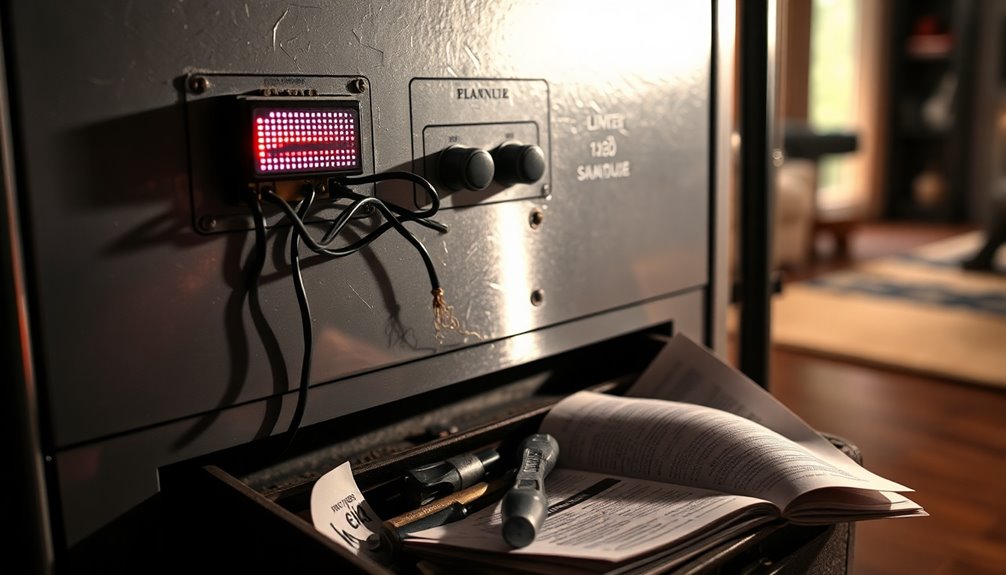
When your furnace starts clicking, it often signals electrical component failures that can disrupt its operation. These issues may stem from various parts of your furnace, and addressing them promptly is essential for safety and efficiency.
Here are some common causes of clicking sounds:
- Defective igniters: They may struggle to initiate the ignition, causing repeated clicking.
- Malfunctioning flame sensors: If the sensor can't detect the flame, the furnace will keep attempting to ignite.
- Loose or damaged wiring: This can lead to intermittent operation, creating clicking as connections falter.
- Worn motor bearings: As the fan works harder, you might hear clicking or shrieking noises.
- Worn-out capacitors: These can affect the fan's ability to run smoothly, leading to further clicking sounds.
Ignoring these electrical component failures can lead to more severe issues down the line. It's crucial to address the clicking promptly, as it indicates potential ignition problems or failure to start properly.
Regular maintenance of these components not only keeps your furnace running efficiently but also enhances safety, reducing the risk of dangerous situations.
Importance of Regular Inspections
Keeping your furnace in top shape relies on regular inspections that catch potential problems before they escalate. Scheduling annual check-ups with an HVAC technician is essential for maintaining your furnace's efficiency and extending its lifespan.
These professional tune-ups can identify issues like a dirty flame sensor or a faulty ignition system, which, if ignored, could lead to dangerous situations.
By staying on top of inspection dates, you not only improve your furnace's performance but can also reduce energy costs by up to 30%. A thorough inspection guarantees critical components, such as the heat exchanger, are intact, preventing hazardous gas leaks from undetected cracks.
Moreover, addressing small issues during these inspections can save you from costly repairs later on, giving you peace of mind throughout the heating season.
Regular maintenance also allows your HVAC technician to provide valuable insights on optimizing your system's operation. In short, investing in routine inspections is a proactive approach that safeguards your home and enhances the longevity of your furnace.
Don't wait until a clicking sound signals trouble—schedule your inspection today!
Budget-Friendly Maintenance Tips
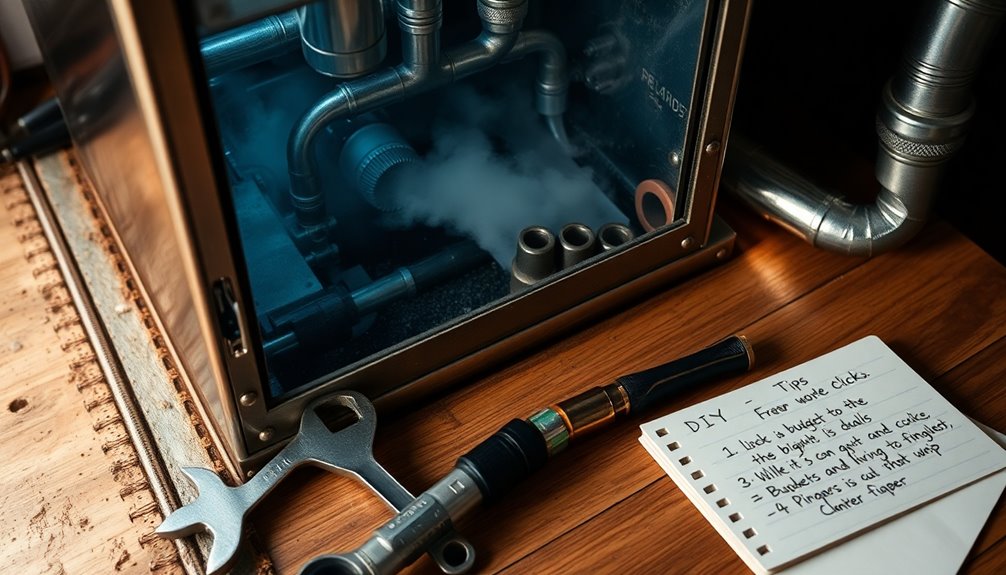
To guarantee your furnace runs efficiently without breaking the bank, it's crucial to adopt some budget-friendly maintenance tips. Regular upkeep not only enhances performance but can also save you money in the long run.
Here are some practical steps you can take:
- Replace air filters every 1-3 months to maintain proper airflow and reduce strain on the furnace, which can lower your energy bills.
- Inspect the furnace and ductwork visually each season for loose connections or debris, preventing inefficiencies and unnecessary noise.
- Clean the area around the furnace to keep it free of dust and debris, which can lead to operational issues if foreign objects enter the system.
- Use a vacuum or soft brush to clean the blower motors and surrounding components, helping to maintain efficiency and extend the life of your furnace.
- Schedule annual professional inspections at a lower cost than emergency repairs, catching potential issues early and avoiding costly breakdowns.
Implementing these budget-friendly maintenance tips will help guarantee your furnace operates smoothly, ultimately saving you time and money.
When to Call a Professional
If your furnace is clicking but not igniting, it might signal ignition system failures or gas supply interruptions, and you shouldn't ignore it.
Unusual sounds or odors alongside the clicking could indicate serious safety hazards that require immediate attention.
When in doubt, it's always best to call a professional to guarantee your home's safety and your peace of mind.
Ignition System Failures
Often, homeowners may find themselves puzzled by persistent clicking sounds coming from their furnace, which typically signals an ignition system failure. If you hear this, don't ignore it. Ignition issues can lead to unsafe gas buildup, and addressing them promptly is essential.
Here's when to call a professional:
- The clicking continues after multiple attempts to ignite.
- Your furnace is over ten years old and hasn't been inspected recently.
- You notice a malfunctioning flame sensor, causing the furnace to shut off.
- There's a visible issue with the electric igniter or wiring.
- You smell gas or detect unusual odors near the furnace.
Don't risk safety by attempting to diagnose these problems yourself. A professional can inspect your ignition system for issues like a defective igniter or wiring problems.
They can also clean or replace the flame sensor if needed. Remember, any signs of ignition issues should prompt immediate action to guarantee the proper functioning and safety of your furnace.
It's better to be safe than sorry when it comes to your home's heating system.
Gas Supply Interruptions
Clicking sounds from your furnace mightn't just signal ignition system failures; they can also indicate gas supply interruptions. If your furnace struggles to ignite, the cause could be a lack of gas flow due to clogged gas lines or a defective gas valve. These issues prevent your furnace from operating safely and efficiently.
To assess the situation, check other gas appliances in your home, like water heaters. If they're also malfunctioning, it's likely you're facing a broader gas supply issue. If you suspect gas supply interruptions, don't hesitate to call a professional. Tampering with gas lines can lead to serious safety risks, and only a trained technician should handle repairs or inspections.
Regular maintenance is essential for preventing gas supply interruptions. Schedule routine check-ups for your furnace to guarantee that everything, including the gas lines and valves, is functioning properly.
Safety Hazard Indicators
Your furnace's clicking sounds can serve as essential safety hazard indicators, signaling when it's time to call a professional. Ignoring these noises can lead to dangerous situations, so stay vigilant.
Here are some signs that warrant a call to a trained technician:
- Ignition issues: If you hear clicking noises without ignition, it may indicate a problem that could cause gas buildup, risking explosions.
- Gas odor: A persistent gas smell alongside clicking sounds signals a gas leak, which requires immediate attention.
- Cracked heat exchanger: Excessive clicking after operation could mean a cracked heat exchanger, posing a carbon monoxide risk.
- Shutdown or failure to ignite: If your furnace clicks but doesn't start, this could indicate a malfunctioning flame sensor or igniter.
- Unresolved clicking: Any unusual clicking that persists after basic troubleshooting—like checking the gas supply—should prompt a call to an HVAC specialist.
Safety Precautions for Homeowners
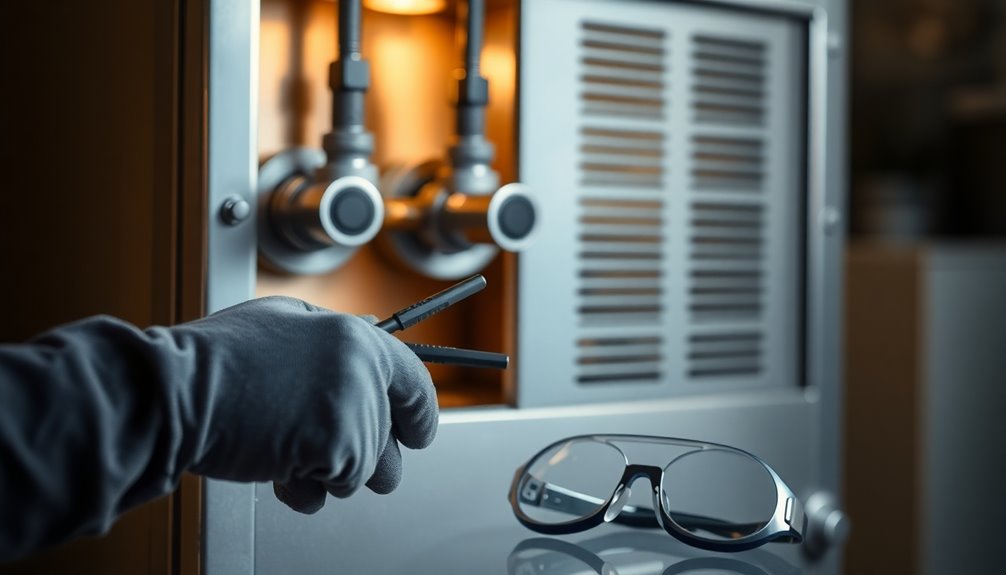
Ignoring the clicking sounds from your furnace can lead to serious safety hazards, so it's essential to take immediate action. These noises often indicate ignition or gas supply issues that could result in dangerous situations like gas leaks or fires.
To guarantee your safety, regularly inspect your furnace and its components, particularly the flame sensor and ignition system. This proactive approach can help you identify problems early.
Make sure all gas valves are functioning properly and check for any obstructions in the gas supply. Addressing these issues can prevent unnecessary clicking and potential gas buildup.
If the clicking noises persist, don't hesitate to contact a certified HVAC professional. They can assess your furnace and perform any necessary repairs to guarantee safe operation.
Additionally, keeping a clean environment around your furnace is key. Routine maintenance, such as changing air filters and cleaning ducts, minimizes the risk of clicking sounds and enhances overall safety.
Conclusion
Ultimately, a clicking furnace can be like a warning light on your dashboard—it signals that something needs attention. By understanding the common causes and implementing budget-friendly maintenance tips, you can keep your furnace running smoothly and safely. Don't let small issues snowball into bigger problems; regular inspections are key. If you're ever in doubt, don't hesitate to call a professional. Keeping your home warm shouldn't feel like a gamble—stay proactive and protect your comfort!

